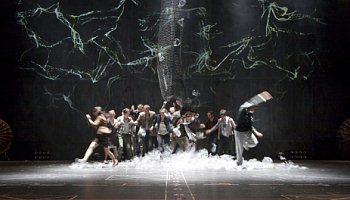Greenland
What is the most pressing and important issue facing humanity? Terrorism? Population growth? Invasion by alien beings from a distant galaxy? Or what about global warming? Going by the reaction of governments around the world, you wouldn't think that the latter was of particular significance. But, if even the least pessimistic predictions from scientists turn out to be true, our children and their children are in for a rough ride. Melting glaciers, rising sea levels, catastrophic floods, massive changes to animal and human populations are just a few of the effects they might have to encounter. It's a bleak vision.
In 'Greenland' the National Theatre examines some of the causes and effects of climate change in what is akin to a series of sketches rather than a single narrative. In effect, we witness different interactions through which we learn about different points of view. For example, we head off to the Copenhagen summit held in 2009 in the company of two delegates from Malawi. Their impoverished country - the third poorest in the world - is likely to lose two thirds of it's farmland by 2025 if predictions are correct. When they get to the conference, they are faced with endless wrangles over procedures ('negotiation by exhaustion'), voluminous translations and documentation, and an American president who seemingly is only interested in getting back home before the airport freezes over. We are also introduced to a recent graduate in sports science who becomes an activist, and a scientist who has spent years modelling the global climate, but who simply longs to settle down with a partner and raise a family.
Written by a veritable gaggle of writers - Moirai Buffini, Matt Charman, Penelope Skinner and Jack Thorne - 'Greenland' is, thus, a collaborative venture which contrasts rather markedly with the lack of collaboration the world's governments have managed to achieve. And the result works well, even if there is no linking storyline. What the writers have produced is a summary of the current state of play - or lack of it - in the global warming stakes. Admirable and accurate though it might be, it's hardly likely to persuade non-believers to convert to the faith, or to spur those already convinced of global warming to do very much more. Indeed it's at the governmental level where action is required, because only in that arena can decisions be made on the scale required and that will make a real difference.
Bunny Christie could hardly come up with a set design which was glitzy and materially extravagant given the nature of the subject. What she's settled for is a stripped-down, bare set where lighting and sound provide the main effects together with odd bits of furniture such as a chair which seems to have been recycled after a previous life in a school classroom. Projections on the back wall not only provide us with some data - such as the famous (or infamous) 'hockey stick' graph - but also videos of characters speaking to other characters on the stage. The overall effect, is stark and austere.
The lively ensemble cast is well directed by Bijan Sheibani who provides us with a well-paced piece that maintains interest throughout. There's not much humour in the show, though there are one or two gems, for example when a newspaper writer is challenged on his certainty about an outcome says 'I write for the Guardian, of course I am sure'. And I warmed immediately to the rather docile polar bear who encounters scientists on it's territorial patch.
In the mid 1980s, a friend called Lawrence Moore was among the first of documentary filmmakers to focus on global warming in his ground-breaking programme entitled 'Can Polar Bears Tread Water'. Some 30 years later, it's depressing to see that not much has really been done to tackle the problem. And I for one can't see that humanity will get it's act together quickly enough to avoid what now seems like an inevitable catastrophe. And whatever action we do undertake is likely to be 'too little, too late'. In a sense, you could say that is the message that 'Greenland' presents us with. But, to be fair, the authors have taken the trouble to consider the arguments, and present a fair summary of views and roles, including the role of the individual.
Of course, global warming is a hugely complex issue as 'Greenland' makes clear. But I was left wondering just what the intention of the play really is. It's not radical or ingenious enough to be a persuasive call to arms, and yet it has sufficient emotional commitment to make it fit uneasily with pure objectivity. Interesting, though.
"Ungripping and unwieldy slice of "documentary theatre" about climate change."
Fiona Mountford for The Evening Standard
"Well staged, lacks focus"
Michael Billington for The Guardian
"One of the shrillest and most irritating shows in recent memory."
Charles Spencer for The Daily Telegraph
"The evening is undeniably stimulating. It brings home vividly how the debate is not on a level playing field and comes stuffed with historical baggage."
Paul Taylor for The Independent
External links to full reviews from popular press
The Guardian - Daily Telegraph - Independent -
Originally published on
